For me, my tattoos are a storybook of my life, cherished memories I wear on my skin with pride; marking moments in time,
reminding me of where I want to be and symbolising all the loves in my life.
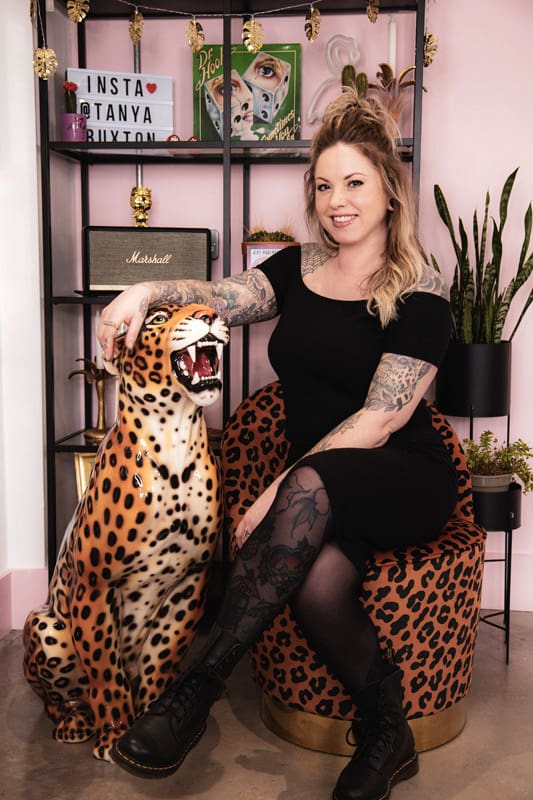
I have been obsessed with tattooing for as long as I can remember. Fascinated by my father’s tattoos as a child, tattooing called to my soul, and was something I always wanted to pursue from a very young age. The rich cultural history and creative freedom that surround this incredible art form is something I’ve always been drawn to.
I started my apprenticeship as a Traditional Tattoo Artist in 2009. I’ve been lucky enough to travel the world through tattooing, working at various studios and conventions and placing myself firmly within the industry, before basing myself in Cheltenham, UK at my studio Paradise. I’ve enjoyed a successful career so far and have been published in a number of magazines, books and online blogs over the years, both in the UK and internationally, including BBC Radio 4, Total Tattoo Magazine, Inked Australia, Memento Publishing and Tattoo Life Magazine.
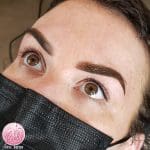
In 2015, I progressed into Cosmetic and Medical Tattooing. I’ve always loved make-up and beauty, and this form of tattooing was something I planned to branch out into from the beginning of my career. Expanding my skills into Cosmetic and Medical Tattooing opened me up to a whole new world of people who can benefit from tattooing. It allowed me to meet people who may not have thought about approaching a traditional tattoo artist (or even felt brave enough) for these types of services.
It was also through Cosmetic and Medical Tattooing that I realised just how wonderful tattooing can be for people and the many positive affects it can have on a person.
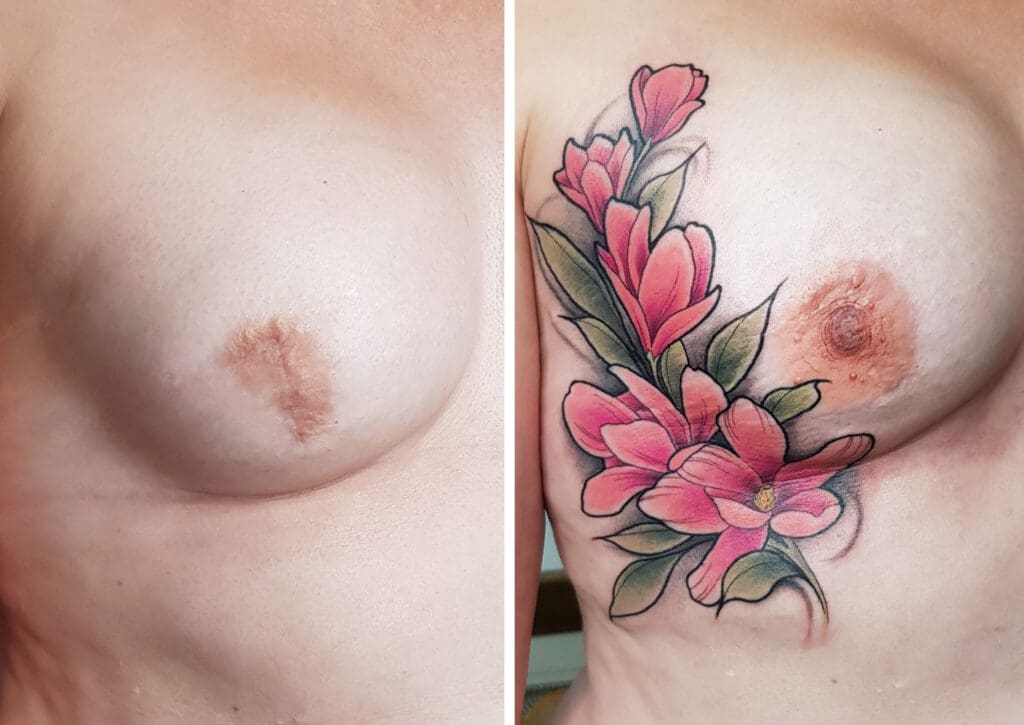
I have seen first-hand the impact tattoos have on people, from decorating a scar with a beautiful piece of art to recreating a realistic 3D nipple after mastectomy surgery, tattoos can help heal a person inside and out. They can mark a milestone moment, symbolise a new beginning or celebrate cherished memories in a person’s life; they enable people to reclaim their bodies and transform their skin into something they love, helping them to move forward, build self-esteem and boost body confidence.
What is Areola Tattooing?
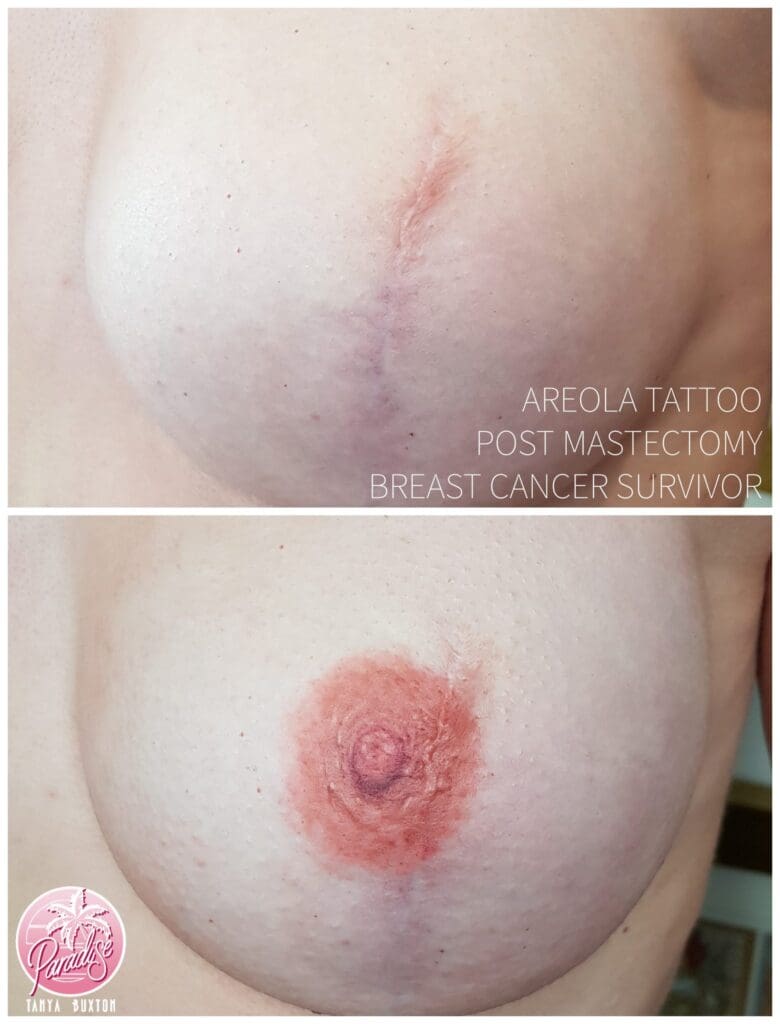
Areola Tattooing is something I feel extremely passionate about; the healing and empowering capabilities of these tattoos, for breast cancer survivors in particular, is truly remarkable. Helping to give women a piece of themselves back and feel more complete after their mastectomies. Our nipples are a part of our identity, often taken for granted, but when taken away can have a huge impact on a person’s confidence, which is why this type of tattooing is so important.
Areola Tattooing is a highly specialised tattooing skill, most commonly known for reconstructing and enhancing the nipple area for breast cancer survivors. Small sterile needles and high-quality tattoo machines are used to gently implant ink into the top layers of the skin to create a beautiful, realistic areola. These tattoos play a vital part in the healing journey for many survivors, helping them regain their confidence and body positivity.
3D Reconstruction Nipple Tattoos are also a great option for anyone who has had top surgery (also known as gender reassignment surgery), nipple reconstruction or grafts, and breast surgery where the nipple has been lost or comprised.
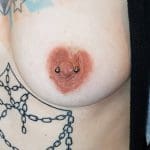
Areola tattooing can be used to enhance natural nipples too, adding shape, increasing size and boosting colour. Heart shaped areola have also become a popular trend, offering a fun alternative to a natural areola shape.
This form of tattooing is extremely skilled; working on scarred, radiated and delicate skin takes a great deal of tattooing experience and artistic skill to execute safely and successfully. It’s a skill that takes years to master and it’s so important it is performed by a trained artist experienced in traditional tattooing; inexperienced artists are likely to cause trauma to the skin, resulting in a poor quality and badly healed tattoo.
In the past Areola Tattooing was mainly performed by Cosmetic Tattoo Artists and Medical Professionals; referred to as ‘Medical Micropigmentation’ these types of tattoos were typically done using cosmetic pigment.
Cosmetic pigment is specially designed to gradually breakdown and fade in the skin over time; making it a perfect choice for using on the face to execute cosmetic make up tattoos, such as brows, eyeliners and lips. The reason for using cosmetic pigment on the face is that it allows for changes and adjustments to be made to the cosmetic make-up tattoo as the skin ages over time.
However, using cosmetic pigment to produce ‘semi-permanent’ results is not a safe or suitable option for Areola Tattooing. Semi-permanent results mean regular ‘top ups’ are required, and over time this has a negative impact on the skin. Repeatedly disrupting the already delicate skin and scarred tissue (from surgery) can result in further damage being done, which can lead to more scar tissue being created and will cause poor healed results of the tattoo.
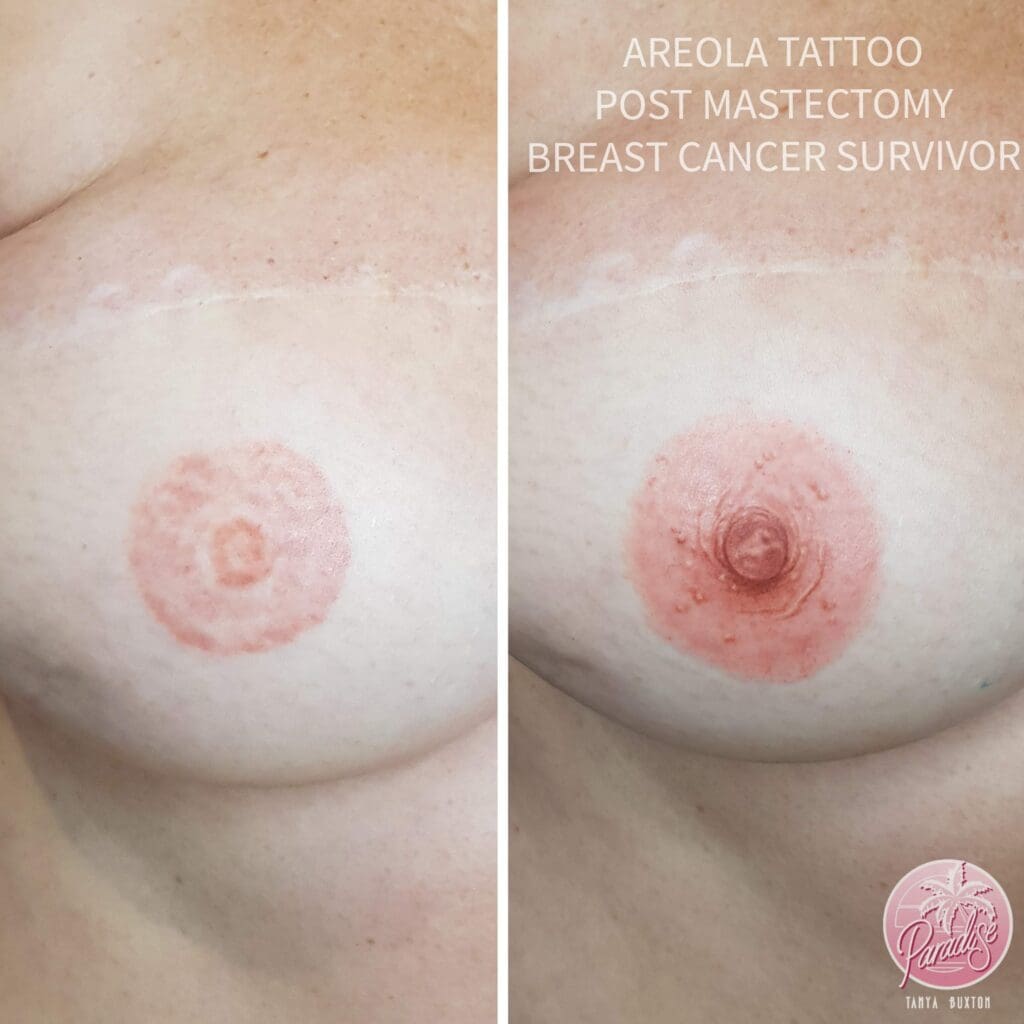
These regular and long-term ‘top up’ appointments are not a sustainable approach to Areola Tattooing, not just physically on the skin but emotionally on the client. For many people, having their Areola Tattoo done is the final chapter in their healing, it marks the end of their breast cancer journey and symbolises a new beginning. Having to revisit that period of time in their life, year after year, for regular ‘top up’ appointments is not only inconvenient but can also prevent a person from being able to fully move forward emotionally; not to mention the negative impact it can have on their body confidence. The women I tattoo have sought me out specifically for permanent Areola Tattoos for these very reasons; they don’t want to be reminded of their breast cancer, they want to close the door on that chapter and move forward, their Areola Tattoo symbolises this.
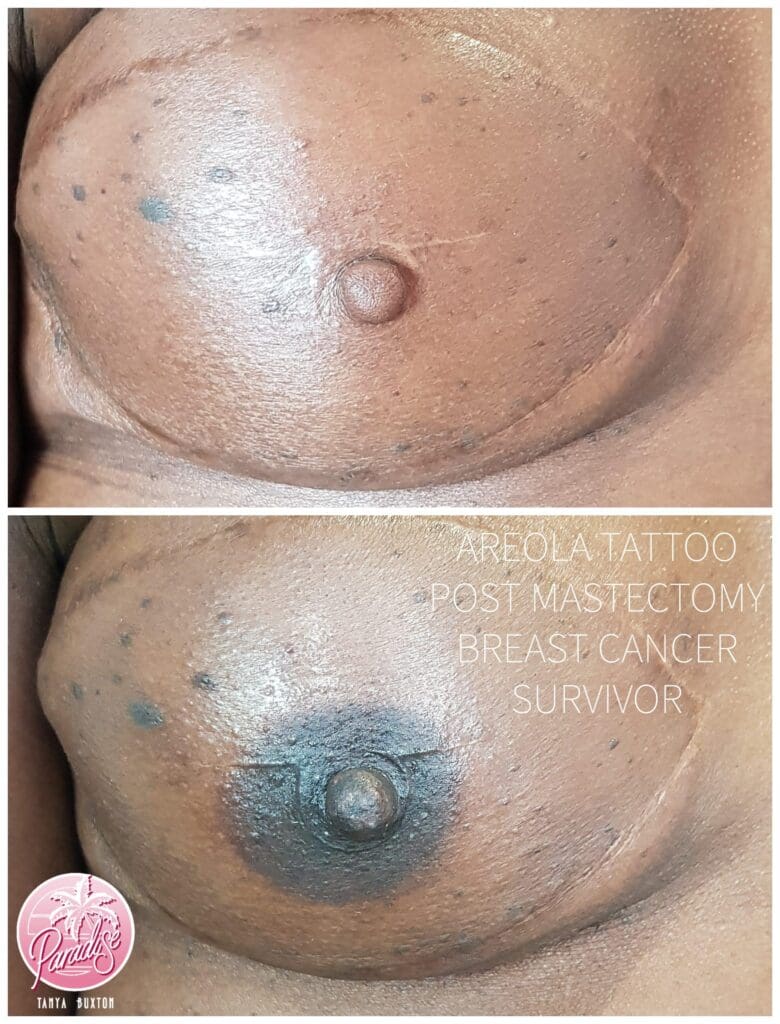
This is why it is important permanent tattoo inks are used for Areola Tattooing. I believe the skin should be respected; Areola Tattoos should be built to last and completed in as fewer sessions as possible, ensuring the skin is treated with care and kept as healthy as possible. Professional tattoo inks are produced to extremely high standards and go through rigorous safety checks to meet strict regulations. They come in a huge variety of colours and tones and are designed to be more stable in the skin, meaning they stay true to colour and fade very little as your skin ages.
Why choose a tattoo artist?
The misinformation given to the medical industry discouraging the use of trained Tattoo Artists and permanent tattoo inks is something I feel very strongly about.
Tattoo Artists have the experience, knowledge and proper equipment to execute these tattoos to their full potential. We tattoo day in day out, it’s our field of expertise and for many of us, it’s our entire world.
The skin is the largest organ in the human body, living, breathing and changing every day. This is why tattooing should not be taken lightly, there are many risk factors to consider whilst tattooing and executing a piece of art perfectly in the skin is not an easy task.
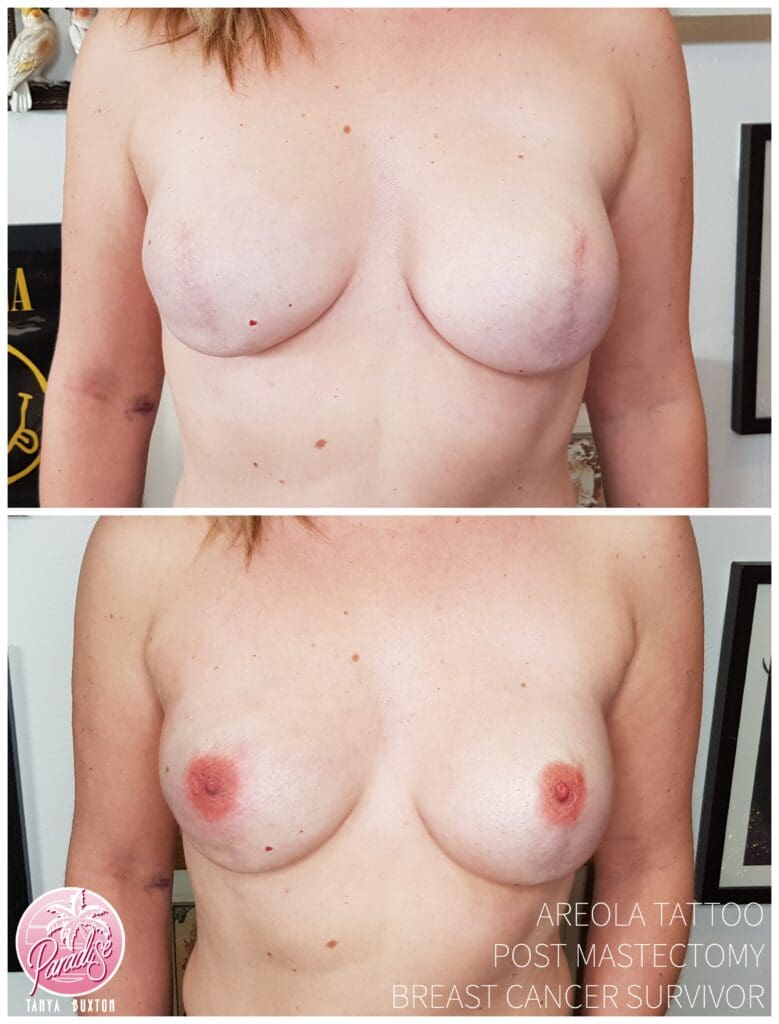
Areola Tattoo services are provided to survivors by some NHS hospitals, which I think is really wonderful, we are so lucky to have the NHS in the UK. However, lack of funding, time and education, along with limited resources mean it is often carried out by medical staff, who more often than not, have received minimal training and experience in this specialised field. As mentioned earlier, tattooing is a highly skilled craft both technically and artistically that takes years to master; and while these tattoos are done with the best of intention within hospitals, these tattoos are often of poor quality and don’t heal well in the skin. This is devastating for the client and can have a huge impact on their body confidence and mental wellbeing.
Most Areola Tattoos performed in hospitals are also tattooed with ‘semi-permanent’ cosmetic pigment meaning regular top up appointments are required year after year. Tattooing the skin repeatedly like this is not only incredibly traumatic to the skin but can also be emotionally damaging for the client too. For this reason, it is vital only experienced medical Tattoo Artists should perform these types of tattoos with permanent ink.
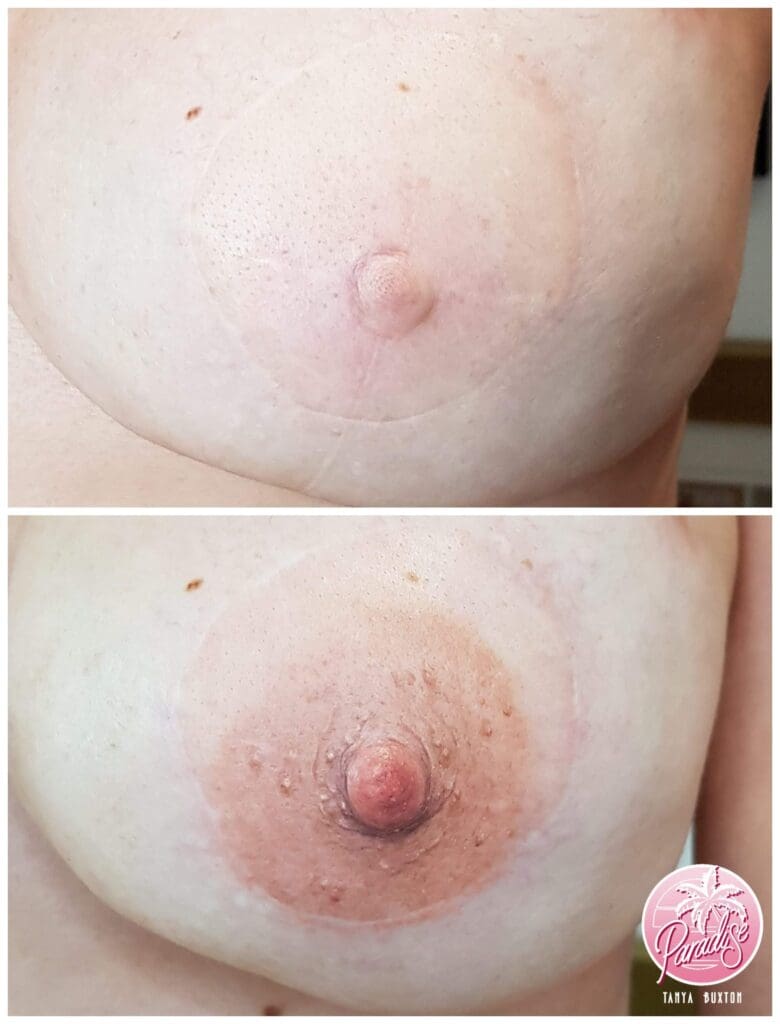
Another important factor is the pressure providing these tattoos has on the NHS, they require expensive equipment, time and manpower. With such a demand for these life changing tattoos, hospital waiting lists can be extremely long, preventing women from being to fully move on from their breast cancer. This is something the tattoo industry can help with. Allowing trained Tattoo Artists to relieve this pressure is something I would love to work alongside with the NHS and medical industry.
My passion to empower more survivors with these amazing tattoos, improve industry standards and help take the pressure off the NHS led to the creation of the Mastectomy Tattooing Alliance. Founded by myself in January 2021, the MTA is a non-profit organisation focused on supporting Breast Cancer Survivors reclaim their bodies. Our goal is to make these life changing tattoos more affordable and more widely accessible to people by providing funding and connecting them with professional tattoo artists. All MTA Artists are hand-picked for their excellent level of artistry and skill; ensuring peace of mind to survivors that their mastectomy tattoos are executed to a high standard by a trained and experienced artist. The Mastectomy Tattooing Alliance are also dedicated to helping improve the information and education available for this wonderful form of tattooing and aim to raise more awareness to the many options available to people through tattooing.
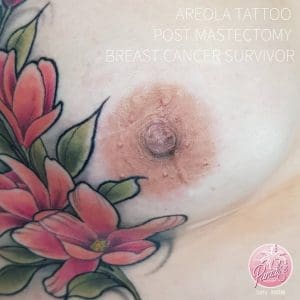
I have such a huge admiration for these brave women (and men) they are my inspiration every day. I think all breast cancer survivors deserve the opportunity to receive a beautifully executed mastectomy tattoo, whether it is a decorative tattoo design or a realistic 3D nipple, they should be able to celebrate their amazing bodies in any way they wish; and I’ve made it my mission to help in every way I can.
Tanya Buxton